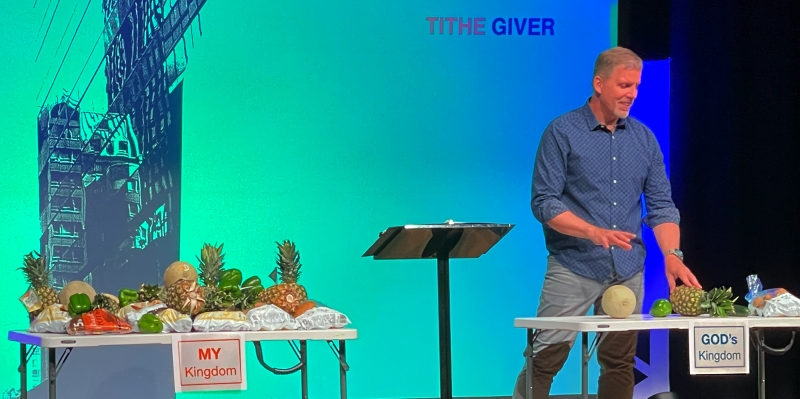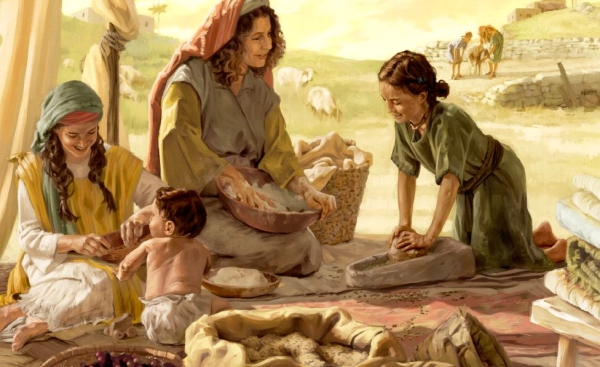Biblical Finance
May 11, 2025Pastor Patrick presented today's message, "Biblical Finance." A video of today's message is here on YouTube.
TimberCreek Church Announcement: In a few weeks, TimberCreek will start a sermon series entitled "You Asked For It." The title is literal. You can ask for specific scripture verses to be explored/explained. To submit a verse to be considered for this series, use this form.
Now, back to our regularly scheduled programming...
This is my 200th weekly essay! I thought I'd take a look at any meaning(s) 200 might carry in the Old Testament. See 200 | Two Hundred | מָאתָֽיִם (below).
Leviticus 27:30-32, "And all the tithe of the land, whether of the seed of the land, or of the fruit of the tree, is the Lord's: it is holy unto the Lord. And if a man will at all redeem ought of his tithes, he shall add thereto the fifth part thereof. And concerning the tithe of the herd, or of the flock, even of whatsoever passeth under the rod, the tenth shall be holy unto the Lord." (KJV).

The above passage, when read carefully, adds some detail to what we normally think of as tithing: "Giving 10% of our best to God, first." Old Testament discussions of tithing add some unfamiliar details. First, tithing takes place at various times for various reasons throughout the year. If each is handled properly, the overall giving percentage over a year could easily exceed 20%. Another thing is that tithing is not always "the best." The last phrase of the verses above indicates a couple things. Every tenth of the flock is pulled out to tithe regardless of its quality (not always "the best"). Also, if you have 29 animals in the flock, you'll not get to the 3rd "tenth" and therefore you'll tithe only 2 out of 29 which is only about 7%, or 1 out of 19 which is about 5%. And just a couple more tidbits... The tithing was only on "fruits of the land," i.e. agricultural income; nothing on trades such as carpentry, artisans, etc. Every 7th year was a sabbatical year during which tithing was suspended altogether.
In the Torah, tithing is about obedience, not generosity (that comes later in the New Testament). And it is for our own benefit that we are commanded to give. According to ThePursuitNW.com, this is "why I tithe":
- Provides for God's house
- Tells God we trust Him
- Creates margin in life for God to fill
- Reminds us we are not the source
- Connects my money to a Kingdom purpose
- Gives my job eternal significance
- Transforms our money into seeds
- Breaks greed and self-reliance
- Lets everything and everyone else know God is first
Bonus
Motherhood in the Old Testament

Here's an excellent article about Motherhood in the Old Testament.
A few quotes from the article:
"Countless people today believe ... that motherhood is a burden and that there are better areas for women to pursue. But many mothers in the Old Testament would disagree. These women offer several lessons for modern-day matriarchs. In contrast to some current philosophies, the Old Testament teaches the importance of motherhood by establishing the significance of posterity and the influence and blessings that come from raising children. It provides several accounts of sacrifices mothers made and shows how those sacrifices changed history. The Old Testament also teaches of the powerful influence mothers have—not only on their children but on entire nations and future generations."
"Just as modern mothers have a variety of roles and time-consuming responsibilities, so too did ancient mothers. These tasks included 'keeping the home in order, caring for small children, tending gardens and small animals, producing textiles, and taking responsibility for food preparation and preservation.' These duties were often lengthy and complicated. For example, in order to provide clothes for the family, sheep or other animals had to be sheared. 'After shearing, the wool or hair was beaten to free it from embedded dirt or leaves. Then the mother of the family, assisted by her daughters, combed the wool, spun it into thread, wove it on the family loom, and sometimes dyed the cloth in a vat.'"
"In addition to managing the home, mothers in the Old Testament were highly involved in the lives of their posterity. They had a large role in the training and instruction of their children (see Deuteronomy 21:18; Proverbs 1:8; 6:20) and significantly influenced their future (see Genesis 27:1–17). We note that 'of the forty-six recorded instances of naming children in the Old Testament, in twenty-eight the name is given by the mother. It is generally accepted that name giving in the Old Testament represented an expression of authority.'"
"Eighty-four mothers are mentioned by name in the Old Testament. Valuable lessons can be learned from these women, as well as the unnamed Old Testament mothers. Consider the following examples..." The article discusses Hannah, Jochebed, and Rizpah. The three great matriarchs are also discussed: Sarah, Rebekah, and Rachel.
As I've mentioned now and then, one of the ways to express the bottom line of God's instructions to us is to "Be fruitful and multiply, and propagate 'the Way.'" Mothers are absolutely imperative for the success of both.
It's also worth mentioning that both parents are to be honored equally according to the 5th of the Ten Commandments. The pronoun "your" is repeated for both father and mother: "your father and your mother", not just "your father and mother" thus emphasizing the equal importance of both.
Here's an interesting take on motherhood on a PragerU video: RaeLynn: Getting Married Was My Boldest Act of Rebellion ("Stories of Us" series).
Bonus2
200 | Two Hundred | מָאתָֽיִם (mah-TAH-yeem)
 As you're probably aware, numbers in the Old Testament (OT), including the Torah, can add meaning to the topic at hand. Seven, for instance, can indicate completion, perfection, and holiness. Forty means alot/many. So, does the number 200 carry any meaning?
As you're probably aware, numbers in the Old Testament (OT), including the Torah, can add meaning to the topic at hand. Seven, for instance, can indicate completion, perfection, and holiness. Forty means alot/many. So, does the number 200 carry any meaning?Turns out the answer is yes, but not all is good.
As with all numbers in the Old Testament, the number 200 is spelled out (see the title of this Bonus). There are no digits available in the language at this point. The root for hundred is may-aw (מֵאָה). The Old Testament uses "hundred" as a part of numbers ranging from 100 to over one million as well as thoughts such as hundredfold and hundredth. In total, "hundred" is used nearly 600 times in the Old Testament.
According to BibleStudy.org, "200" is used about 86 times in the King James Bible and generally means insufficiency such as the Joshua/Ashan story of the theft of 200 shekels of silver (Joshua 7).
From another angle, the Hebrew word kabod (כָב֖וֹד), which means dignity or glory (as in "the glory of God", Psalm 19:1), appears 200 times in the OT.
Factoring two hundred yields an interesting 2 cubed times 5 squared (2x2x2x5x5 = 200). Both 2 and 5 are prime numbers. Later, the letter resh (ר) in Hebrew and sigma (Σς) in Greek came to represent 200.
For more, see Number 200: What does it mean in the Bible? And here's another take on 200: Biblical Meaning of the Number 200.
(In case you missed today's essay above, we're looking at 200 today because the essay above is the 200th consecutive weekly essay since I started doing these in 2021.)
Bonus3
Nonnas (the Movie)
Just in time for Mother's Day...
 Nonnas means grandmothers in Italian. Vince Vaughan, as Joe, opens a restaurant serving food cooked by four grandmothers.
Nonnas means grandmothers in Italian. Vince Vaughan, as Joe, opens a restaurant serving food cooked by four grandmothers."The best memories are served family style."
It's based on the true story of Joe Scaravella opening Enoteca Maria ("Maria's Wine Shop/Cellar") on Staten Island in 2007 to honor his mother who had passed away. The real-life Joe actually appears in the background during the movie (sitting across from the food critic in the final dining scene).
Nonnas opened May 9, 2025, only on Netflix. Here's the IMDB entry (including the trailer which is quite fun all by itself).
Dig in!